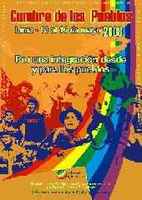Declaration of the People’s Summit
Linking Alternatives 3 (13-16 May 2008, Lima)
Social, political, popular movements, workers, migrants, indigenous peoples and peasants, women’s and youths’ movements, and trade union organisations of Latin America, the Caribbean and Europe, meeting in Lima for the Peoples’ Summit, Linking Alternatives III, herby declare:
Cooperation and integration of our peoples begin firstly by creating a system in which economic, political, social, cultural and environmental rights of the majority are given priority and form the core of government’s policies. As a result, we reject the project of Association Agreement proposed by the European Union and endorsed by several governments of Latin America and the Caribbean, which only aim to deepen and perpetuate the current system of domination that has caused so much harm to our peoples.
The European Union’s “Global Europe Competing in the World” strategy, entails deepening policies of competition and economic growth that search to implement the agenda of its multinationals, and deepen neoliberal policies that are all incompatible with the discourse on climate change, poverty reduction and social cohesion. In spite of trying to hide its true nature by incorporating themes of cooperation and political dialogue, the aim of the proposal is to open up capital markets, goods and services, to protect foreign investment and to reduce the State’s capacity to promote economic and social development. This has implications in both regions:
For Latin America and the Caribbean, this strategy reproduces the framework of the Free Trade Agreements that most countries of the region along have signed with the United States, and go further than the WTO policies that we reject. European multinationals are largely responsible for the indiscriminate exploitation of the natural resources of these countries, displacing entire communities, destroying biodiversity, depleting water sources, and impoverishing the workforce. Latin America has long been the victim of looting by multinational companies, and now, when democratic progress has led many countries to search for their own development and integration paths for the benefit of the people, many governments that follow the recipe of free trade are encouraging the break up of the region by means including national confrontation and contradiction.
In Europe, one of the biggest threats to democracy, justice, peace and ecological balance is the Treaty of Lisbon, which is being ratified by elites, without consulting the population and we reject this Treaty as we did in the past. This Treaty reinforces a neoliberal Europe, increases militarisation, exclusion, inequalities, commoditisation, and it also toughens repressive, security policies. This is reflected in an increasing precariousness, a general attack on all social rights, in particular on former labour conquests. At the same time, it is speeding up the construction toward a “Fortress Europe”, which implies closing the borders, violating asylum rights, and criminalizing immigrants and social movements, creating virtual or real walls, which are no different from those that are being built on the borders of North America.
The Association Agreement that The European Union has signed with Mexico and Chile have worsened the inequalities and demonstrates what will happen to those who sign these Agreements in Central America, the Andean Community of Nations and MRECOSUR, whose negations they want to resume. For countries in the Caribbean, these recently signed Agreements, will increase the vulnerability and dependence of these economies, and at the same time, they will break up the dynamic of sub-regional integration.
In Lima, at a time when governments speak of social cohesion, climate change and poverty reduction, we should remember that the main cause of inequality, social polarisation, environmental degradation and discrimination is the placing of the market above peoples’ rights and the complicit governments granting guarantees to corporations, that eliminate the state’s capacity in defining national development projects. The multinationals have double standards, benefiting from the asymmetries that the Association Agreements tend to reinforce. Consequently, the speech on Cooperation and Political Dialogue is just a red herring for hiding the true interest of these corporations.
In face of the food crisis which is affecting many countries, we denounce the hypocrisy and the policies of multilateral organisations (WTO, IMF, WB, IDB, EIB) which try to hide the real causes: the directing of countries’ production for export, the loss of the State’s role in food regulation and the conversion of food into a source of financial speculation, all of which are results of “free trade policies.” Therefore, it is unacceptable to propose more liberalisation and non-protection as a solution to the crisis. The massive production of agrofuels is aggravating the already-difficult living conditions of millions of people. Again, we refuse this false solution to the energy and climate crisis.
Facing this situation, the organisations that make up Linking Alternatives, reiterate that it is possible to have a different integration based on the people’s free determination, respecting the environment, human rights and the democratic processes led by those governments who are moving further away from neoliberalism and searching for equal relationships between peoples of the world. This entails strengthening cooperation between peoples in all areas, reinforcing solidarity, ending all forms of discrimination and ending practices that violate countries’ sovereignty. As demonstrated by the 2nd Session of the Permanent People’s Court, we demand justice and reparation for the offences, damages and prejudices caused by these European businesses, and the redefinition of relations with these companies, in which they assume responsibilities for social and environmental liabilities.
We applaud process of nationalising for national development, strategic companies and natural resources; resources, which belong to the people, and not to the multinationals, as is the case, for example, with the Bolivian telecommunications company ETI/ENTEL. We call on governments who promote progressive policies to join in the transformation process that we are calling for. We reject the defiant US and European Union interventions against the sovereignty of the peoples. The European Union should assume its responsibility for the historic debt with the peoples of Latin America and the Caribbean, in particular with the indigenous people. We call attention to the dramatic situation in Haiti, the result of decades of exploitation, worsened by the current military occupation. Likewise, we denounce the compliant policy of the European Union toward the Colombian government.
The only solution for the Latin American, Caribbean and European peoples is to unite together in defence of well-being and strengthen resistance and mobilisation against neoliberal policies. We can get inspiration from the contribution of women, indigenous peoples, peasants and other social forces which, through their huge presence at the Social Summit, have been an example of fighting spirit, and the elaboration of alternatives in search of sustained progress in harmony with nature, human rights and the elimination of all forms of discrimination.
We demand that the governments respond effectively to the people’s demands to build another kind of relationship between regions, based on overcoming the market model. We make a plea to the population to stop being deceived by authoritarian governments who try to criminalize fair civil protest. We call on the peoples of Latin America, the Caribbean and Europe to join the ever-increasing number of organisations in search of a better world for everyone to tackle the challenges currently facing humanity.
We invite all social and popular organisations from both continents to start preparing for the next People’s Social Summit, Linking Alternatives IV from now, which will take place in Spain in 2010.


